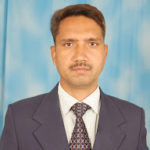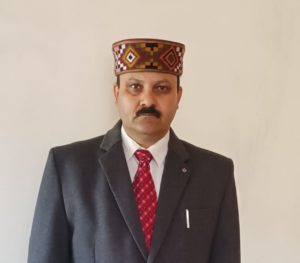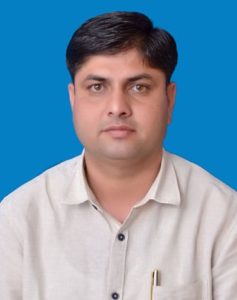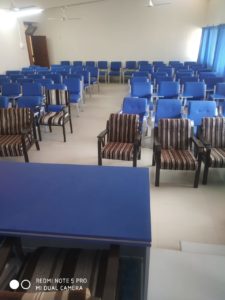Department of Mathematics
- About
- Faculty
- Syllabus
- PSOs
- Subjects(COs)
- Time Table
- Infrastructure
- Lab Guidelines
- Achievements
- Activities
- Collaborations
Department of Mathematics
Year of Establishment: 1965
About the Department
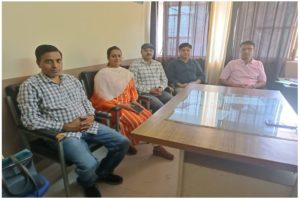 The Department of Mathematics was established in the year 1965. Mr. M. P. Jain was the first Head of the Department. Initially, the department started B. Sc. (Non-Medical) program. From the session 2012-13, the Choice Based Credit System (CBCS) was introduced under Rashtriya Uchttar Shiksha Abhiyan (RUSA) and the semester system was introduced for the first time. Under RUSA, the department offered B. Sc. / B. A. with Mathematics (Pass Course and Honours in Mathematics) and B. Sc. Physical Sciences Courses. From the session 2017-18, the department started a Postgraduate Course M.Sc. in Mathematics. In the session 2018-19, again the Annual System was introduced and the department offered B. Sc. / B. A. with Mathematics (Pass Course) and B. Sc. Physical Sciences Courses under CBCS with the new syllabus as per new UGC guidelines. All faculty members actively engaged in teaching, research and extension activities.
The Department of Mathematics was established in the year 1965. Mr. M. P. Jain was the first Head of the Department. Initially, the department started B. Sc. (Non-Medical) program. From the session 2012-13, the Choice Based Credit System (CBCS) was introduced under Rashtriya Uchttar Shiksha Abhiyan (RUSA) and the semester system was introduced for the first time. Under RUSA, the department offered B. Sc. / B. A. with Mathematics (Pass Course and Honours in Mathematics) and B. Sc. Physical Sciences Courses. From the session 2017-18, the department started a Postgraduate Course M.Sc. in Mathematics. In the session 2018-19, again the Annual System was introduced and the department offered B. Sc. / B. A. with Mathematics (Pass Course) and B. Sc. Physical Sciences Courses under CBCS with the new syllabus as per new UGC guidelines. All faculty members actively engaged in teaching, research and extension activities.
Courses Offered
Name of Programmes/Courses offered:
- B. Sc. (Non-Medical) Pass Course : 1965-66 to 2012-13
- B.Sc. with Mathematics (Honours & Pass Course) : 2013-14 to 2016-17
- B.Sc. with Mathematics (Pass Course) : 2017-18 to Current Session
- Post Graduation (M. Sc. Mathematics) : 2017-18 to Current Session
Annual/semester/choice based credit system (CBCS): UG (Annual System)
PG (Semester System)
Numbers of Teaching Posts:
POST | SANCTIONED | FILLED |
Associate Professor/ Assistant Professor | 06 | 05 |
Vision
- To become an excellent in teaching, learning and research in the country
Mission
- To bring out the potential of students by imparting quality teaching and learning
- To provide a world-class environment where students can learn and become proficient users of mathematics by organising seminars and conferences
- To amplify the importance of mathematics in other disciplines and in the physical world
- To develop analytical skills and logical acumen for problem-solving through dedicated teaching and motivation.
DETAIL OF PAPERS PUBLISHED BY THE FACULTY MEMBERS SERVED DURING THE SESSION: 2017-18 to 2022-23
Sr. No. | Name of Teacher | Research Published During the Session | ||||||
2017-18 | 2018-19 | 2019-20 | 2020-21 | 2021-22 | 2022-23 | TOTAL | ||
1. | Dr. Jagjit S. Patyal | 0 | 0 | 0 | NA | NA | NA | 0 |
2. | Dr. G. C. Rana | 03 | 05 | 05 | 01 | 03 | 09 | 26 |
3. | Ms. Kalpna Chadha | NIL | NIL | NIL | NA | NA | NA | 0 |
4. | Mr. Rajesh Kumar | NA | NA | NA | 0 | 0 | 0 | 0 |
5. | Dr. Sanjay Kumar Kango | 02 | 01 | NIL | NIL | 01 | NIL | 04 |
6. | Dr. Divya Sharma | 0 | NA | NA | NA | NA | NA | 0 |
7. | Dr. Poonam Sharma | NIL | NA | NA | NIL | 01 | NIL | 01 |
8. | Mr. Ashok Kumar | NIL | NIL | NIL | NA | NA | NA | 0 |
9. | Mr. Pawan Kumar | NIL | NIL | NIL | NIL | NIL | NIL | 0 |
10. | Dr. Sunil K. Sharma | NA | 01 | 01 | NIL | NA | NA | 02 |
11. | Dr. Nirmal Singh | 01 | NIL | NIL | NIL | NIL | NIL | 01 |
Total Paper Published (2017-23) | 34 | |||||||
FACULTY DETAILS:
Sr. No. | Name of Teacher | Designation | Qualifications |
1. | Dr. G. C. Rana | Associate Professor & Head | M. Sc. M. Phil. Ph. D. |
1. | Mr. Rajesh Kumar | Assistant Professor | M. Sc. M. Phil. |
2. | Dr. Sanjay Kumar Kango | Associate Professor | M. Sc. M. Phil. Ph. D. |
3. | Dr. Poonam Sharma | Assistant Professor | M. Sc. M. Phil. Ph. D. |
4. | Mr. Pawan Kumar | Assistant Professor | M. Sc. M. Phil. |
5. | Dr. Nirmal Singh | Assistant Professor | M. Sc. M. Phil. Ph. D. |
| Sr. No. | Name | Designation | Profile |
1. | Dr. Gian Chand Rana | Assistant Professor | View |
| 2. |  Sh. Rajesh Kumar Sh. Rajesh Kumar | Assistant Professor | View |
| 3. |
Dr.Sanjay Kango | Associate Professor | View |
| 4. | Sh.Pawan Kumar | Assistant Professor | View |
| 5. |
Dr. Nirmal Singh | Assistant Professor | View |
| 5. | Vacant | ….. |
B. Sc. with Mathematics
&
B.A. with Mathematics
&
B.Sc. (Physical Science)
Program Outcomes (POs)
PO1: Solid Foundation: To acquire profound knowledge in various branches of mathematics, including calculus, algebra, differential equations, numerical methods, matrices, and more. Moreover, it facilitates exploration of interconnected domains like computer science and physical science. Consequently, learners can establish a solid foundation for advanced studies in mathematics.
PO2: Critical Thinking: To foster critical thinking skills and equip individuals with the ability to conduct unbiased scientific investigations. This involves the critical evaluation of practices and theories through the application of mathematical methodologies.
PO3: Knowledge Skill: To cultivate students’ abilities in formulating hypotheses, creating models, devising solutions, validating findings, and drawing sound conclusions.
PO4: Communication Skills: To instill effective communication skills for expressing mathematical concepts and ideas.
PO5: Social Responsibility: To enlighten students about the potential of utilizing mathematical knowledge in their lives to contribute to society’s betterment.
PO5: Analytical Reasoning: To equip students with the ability to demonstrate quantitative and analytical reasoning skills effectively.
PO7: Lifelong Learning: To foster a culture of self-learning through self-directed study, peer discussions, and adaptability to evolving academic environments and requirements.
PO8: Leadership Quality: To cultivate a sense of teamwork and leadership skills, enabling individuals to excel both as team members and leaders in various situations.
PO9: Competitive Skills: To cultivate competitive skills among students, enabling them to excel and thrive in competitive environments.
PO10: Ethics: To educate students about the importance of embracing moral and ethical values in their behavior and professional pursuits.
Program Specific Outcomes (PSOs)
At the end of the program, the students will be able to:
PSO1: Utilize mathematical concepts, tools, and techniques in interdisciplinary domains to effectively address real-world challenges and solve complex problems.
PSO2: Enhance understanding of abstract mathematical concepts and foster exploration of potential avenues for further investigation.
PSO3: Mathematically model real-world problems and utilize the resulting inferences to enhance the quality of life.
PSO4: Identify and engage with challenging problems within the realm of mathematics.
PSO5: Dedicate diligent effort to acquire mathematical knowledge and skills relevant to professional pursuits, while upholding the highest standards of ethical values.
PSO6: Comprehend, formulate, and utilize quantitative models that arise in social science, business, and various other contexts.
PSO7: Qualify national-level tests such as JAM, TIFR, Banking exams, CDS, HPPSC, UPSC, and others.
PSO8: Efficiently communicate and explore mathematical ideas to disseminate knowledge and promote the popularization of mathematics within society.
PROGRAM OUTCOMES AND PROGRAM SPECIFIC OUTCOMES
M.Sc. (Mathematics)
Program Outcomes (POs)
PO1: Critical Thinking: To develop critical thinking and prepare them to carry out scientific investigation objectively. Critically evaluate practices and theories by following mathematical approaches.
PO2: Knowledge Skill: To develop skills among the students to formulate hypothesis, modeling, solutions and validate, and draw conclusions.
PO3: Communication Skills: To inculcate the communication skills to express mathematical ideas.
PO4: Social Responsibility: To enlightened the students to serve the society by helping them by using mathematical knowledge in their life.
PO5: Analytical Reasoning: To equip the students for demonstration of quantitative and analytical reasoning skills.
PO6: Lifelong Learning: To inculcate the habit of self-learning through self-directed learning and through peer discussion and adapting to the changing academic environment and demands.
PO7: Leadership Qualities: To develop the team spirit and leadership quality to work effectively as an individual and as a leader in diverse situations.
PO8: Research Skills: Prepare students for pursuing research in various fields of mathematics and research-oriented career.
PO9: Ethics: The students are educated to follow the moral and ethical values in their behavior and professional life.
Program Specific Outcomes (PSOs)
At the end of the program, the students will be able to
PSO1: Apply the knowledge of mathematical concepts and mathematical tools and techniques in interdisciplinary fields to solve the real-world problems.
PSO2: Enrich the abstract mathematical concepts and explore the possibility for further investigations.
PSO3: Modeling the real-world problems mathematically and use the inferences for improvement of quality of life
PSO4: Identify challenging problems in mathematics and work on them.
PSO5: Pursue research in pure/applied mathematics.
PSO6: Work hard to acquire mathematical knowledge and skills suitable to professional activities and follow highest standards of ethical values.
PSO7: Qualify national level tests such as CSIR-NET/GATE and others.
PSO8: Effectively communicate and explore ideas of mathematics for propagation of knowledge and popularization of mathematics in the society
Name of Faculty | Course Outcomes |
Dr. G C Rana | View/Download |
Sh. Rajesh Kumar | |
Dr. Sanjay Kango | |
Sh. Pawan Kumar | |
Dr. Nirmal Singh |
- Organized National Conference on Advances in Mathematical Sciences (NCAMS-2016) held at NSCBM Govt. College, Hamirpur, Himachal Pradesh on 21-22 December, 2016 sponsored by UGC, New Delhi (Received UGC Grants: Rs. 1, 00, 000/-)
- Organized State Level Seminar on Applications of Mathematics in Every Day Life organized on National Mathematics Day, 22nd December 2018 at NSCBM Govt. College, Hamirpur, H. P.
- Organized International Conference on Mathematics in Space and Applied Sciences organized at NSCBM Govt. College, Hamirpur, H. P. on 29-30 November, 2019 sponsored by NBHM, Mumbai and DRDO New Delhi. (Received Grants from NBHM: Rs.1, 10, 000/- and DRDO Rs. 80, 000/-).
- Organised 4-week Online Student Development Course on Foundation of Real Analysis w.e.f.11-08-2020 to 05-09-2020 during COVID Period.
- Organised International Webinar on Contribution of Genius Ramanujan on National Mathematics Day, 22nd December 2020 at NSCBM Govt. College, Hamirpur, H. P. during COVID period.
- Organized State Level Seminar on Importance of Mathematics in other Disciplines organized on National Mathematics Day, 22nd December 2021 at NSCBM Govt. College, Hamirpur, H. P.
- Organized State Level Multidisciplinary Seminar on Importance of Mathematics organized on National Mathematics Day, 22nd December 2022 at NSCBM Govt. College, Hamirpur, H. P.
- Organized 2nd International Conference on Mathematics in Space and Applied Sciences at NSCBM Govt. College, Hamirpur, H. P. on 03-04 March, 2023 sponsored by Ministry of Earth Sciences, Govt. of India, New Delhi. (Received Grants from MoES: Rs.1, 20, 000/-).
List of Seminar organised in Mathematics
DEPARTMENT OF MATHEMATICS
- List of Seminars/Conferences Organized by the Department:
- Organized National Conference on Advances in Mathematical Sciences (NCAMS-2016) held at NSCBM Govt. College, Hamirpur, Himachal Pradesh on 21-22 December, 2016 sponsored by UGC, New Delhi (Received UGC Grants: Rs. 1, 00, 000/-)
- Organized State Level Seminar on Applications of Mathematics in Every Day Life organized on National Mathematics Day, 22nd December 2018 at NSCBM Govt. College, Hamirpur, H. P.
- Organized International Conference on Mathematics in Space and Applied Sciences organized at NSCBM Govt. College, Hamirpur, H. P. on 29-30 November, 2019 sponsored by NBHM, Mumbai and DRDO New Delhi. (Received Grants from NBHM: Rs.1, 10, 000/- and DRDO Rs. 80, 000/-).
- Organised 4-week Online Student Development Course on Foundation of Real Analysis w.e.f.11-08-2020 to 05-09-2020 during COVID Period.
- Organised International Webinar on Contribution of Genius Ramanujan on National Mathematics Day, 22nd December 2020 at NSCBM Govt. College, Hamirpur, H. P. during COVID period.
- Organized State Level Seminar on Importance of Mathematics in other Disciplines organized on National Mathematics Day, 22nd December 2021 at NSCBM Govt. College, Hamirpur, H. P.
- Organized State Level Multidisciplinary Seminar on Importance of Mathematics organized on National Mathematics Day, 22nd December 2022 at NSCBM Govt. College, Hamirpur, H. P.
- Organized 2nd International Conference on Mathematics in Space and Applied Sciences at NSCBM Govt. College, Hamirpur, H. P. on 03-04 March, 2023 sponsored by Ministry of Earth Sciences, Govt. of India, New Delhi. (Received Grants from MoES: Rs.1, 20, 000/-).
- List of Innovative Teaching Methodology:
Teaching-Learning through ppt. mode:
Effective teaching and learning in mathematics through the PowerPoint (PPT) mode involves utilizing the features and capabilities of PowerPoint to enhance the understanding and engagement of students. Here is an explanation of how this can be achieved:
- Visual Representation: PPT allows for the integration of visual elements, such as graphs, diagrams, and illustrations. Visual representations help students visualize abstract mathematical concepts, making them more accessible and easier to understand.
- Step-by-Step Instruction: PPT can be used to present mathematical concepts in a step-by-step manner. Breaking down complex ideas into smaller, sequential steps helps students follow the thought process and grasp the underlying logic.
- Interactive Elements: PPT enables the incorporation of interactive elements like hyperlinks, animations, and multimedia. These interactive features can engage students by allowing them to explore mathematical concepts, solve problems, and interact with the content actively.
- Practice and Application: PPT can include practice exercises, problem-solving scenarios, or interactive quizzes to provide students with opportunities to apply their learning. This promotes active learning and helps students reinforce their understanding of mathematical concepts.
- Real-World Contexts: PPT can be used to connect mathematical concepts to real-world applications. By illustrating how mathematics is used in practical situations, students can better appreciate the relevance and importance of the subject.
- Scaffolding: PPT can be used to scaffold learning by starting with simpler examples and gradually increasing the complexity. This gradual progression helps students build their understanding and confidence, ensuring they are ready to tackle more challenging mathematical problems.
- Formative Assessment: PPT allows for the integration of formative assessment tools such as quizzes, polls, or interactive activities. These assessments can help instructors gauge students’ understanding, identify misconceptions, and provide immediate feedback to guide their learning.
- Visual Organization: PPT enables instructors to organize mathematical content in a visually appealing and logical manner. Well-structured slides with clear headings, bullet points, and subheadings can help students navigate the content and follow the flow of the lesson effectively.
- Multimedia Integration: PPT allows for the integration of multimedia elements, such as videos or audio clips. These multimedia resources can be used to present real-life examples, demonstrations, or explanations, enhancing students’ understanding and engagement.
- Recap and Summary: PPT can be used to recap key points and summarize the main concepts covered in a lesson. This helps students consolidate their learning and provides a clear overview of the essential takeaways.
Overall, the effective use of PPT in mathematics teaching and learning involves leveraging its visual and interactive capabilities to present content in a clear, engaging, and organized manner. By incorporating various instructional strategies and multimedia elements, PPT can support student understanding, application, and retention of mathematical concepts.
- Record of hand-on activities of field trips
NIL
- Record of Internships and projects
NIL
- List of Meritorious students in academics
No Merit List was prepared by HPU Shimla since 2012-13
- List of Students Qualified NET, GATE, GRE etc.
- Jyoti (M. Sc. Mathematics) UGC NET & GATE Qualified
- Vishal Chandel (M. Sc. Mathematics) GATE Qualified
- Detail of IT infrastructure of individual department
- Computer System (All-in-One) 01 No. (Installed in Faculty Room)
- LED Touch Panel 01 No. (Installed in PG Room-129)
S.No. | Session | Meeting/Activity |
| 1
| 2023-24 | |
| ||
MoUs signed


